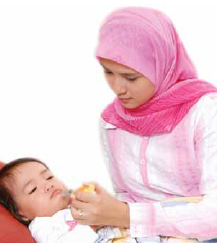Feeding a child has never been an easy task. It becomes doubly challenging when the child is having an upset tummy, cold or fever. Uncomfortable, miserable and irritable, your child’s appetite will diminish rather dramatically.While adequate nourishment is important for a speedy recovery, do not force him to eat. It is all right if he does not eat as much as he usually does. The important thing is to ensure that he gets plenty of fluids and eats some light foods every day.
Drink up
Fluids are crucial during sick days. This is especially true if your child is suffering from diarrhoea or is vomiting as this can quickly lead to dehydration and loss of important salts from the body. You can tell that he is dehydrated if he has not urinated for more than 6 hours, his lips are dry and he is lethargic. In such cases, opt for clear fluids such as:
- Plain, boiled water
- Fruit juices (diluted)
- Honey or glucose drinks
- Barley water
- Clear soups
- Fluids in the form of oral rehydration solution (ORS), prepared according to instructions.
Try to get your child to drink at least 1.5 litres of fluids a day. You can let him drink using a straw – it is fun for him and prevents spillages, which means less cleaning up for you.
As your child feels better and is no longer vomiting or having diarrhoea, you can encourage him to take more nourishing fluids such as soups or porridge.
Eat up
Children will not eat foods they dislike even when they are well, what more when they are sick! Offer your child familiar and favourite foods on sick days. Do not attempt to introduce new tastes at this time. Serve nutritious foods in small, bitesized portions. Go for foods that are easy to swallow such as:
- Bread
- Biscuits
- Breakfast cereals
- Egg
- Noodle soups
- Porridge
RECOVERY TIME
Your child is the best person to let you know when he is ready to have solid food again. Poor appetite simply means that he is still not well enough, so do not rush him. His appetite will naturally improve as he gets better.When he does, offer him nutritious foods to help him regain his energy and quicken the recovery period.
Avoid fatty or fried foods, which are difficult to digest. Instead, go for milk-based drinks or foods such as custard, ice-cream or milk shakes. You can also serve soups, noodles or porridge with little bits of meat, vegetables or fish for the extra nutrients your recovering child will need. You may also give him a multi-vitamin and mineral supplement if he has hardly been eating for a number of days, but do check with your doctor first.






Comments